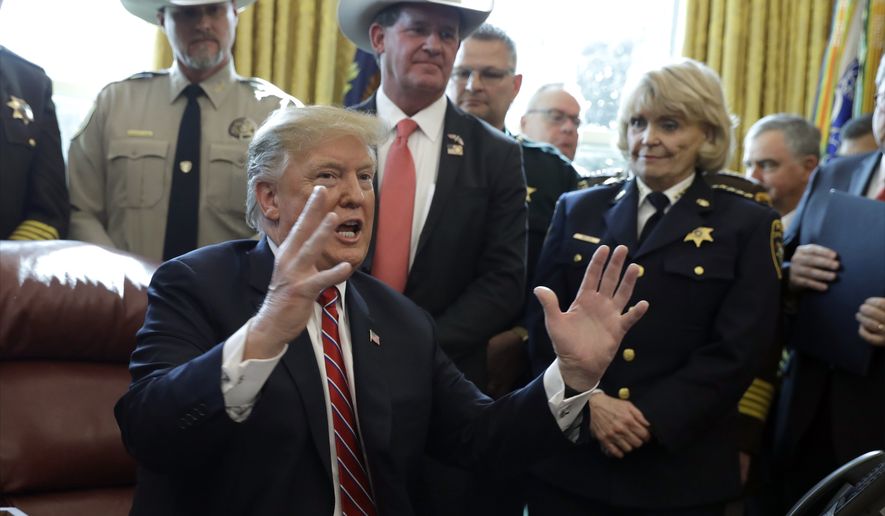President Trump flexed his veto for the first time in his administration Friday, rejecting Congress’s attempt to end his border emergency declaration and halt border wall construction.
Surrounded by “angel moms” who have lost children to illegal immigrant violence, Mr. Trump called the attempt to stop wall construction “reckless” and “dangerous.”
“Today I am vetoing this resolution. Congress has the freedom to pass this resolution and I have the duty to veto it,” he said. “I’m very proud to veto it.”
He was moving with striking speed, rejecting the legislation just a day after it cleared the Senate on a 59-41 vote. It had previously cleared the House 245-182.
House Speaker Nancy Pelosi said her chamber will attempt an override on March 26, after Congress returns from a spring break.
But GOP leaders said there’s more than enough support to sustain the president.
SEE ALSO: House to attempt veto override March 26
In a written veto message Mr. Trump described the dire border situation he said spurred him last month to declare an emergency and to claim $3.6 billion in Pentagon construction money to be used for wall-building.
He said one in three migrant women are sexually abused on the trip to the U.S., 57 migrants each day require immediate medical attention once they reach American soil, and drugs and criminals are traversing the border every day.
“This situation on our border cannot be described as anything other than a national emergency, and our Armed Forces are needed to help confront it,” he wrote.
Senate Minority Leader Charles E. Schumer said the veto showed contempt for Congress and the Constitution, since the president was taking money Capitol Hill had earmarked for military construction projects and funneling it to border wall building.
“There is no emergency,” Mr. Schumer said. “While the president has chosen to trample all over the Constitution, we Democrats in the Senate will never stop defending our country from an overreaching president.”
In addition to the mothers, Mr. Trump was accompanied by law enforcement leaders and Vice President Mike Pence, Homeland Security Secretary Kirstjen Nielsen and new Attorney General William Barr.
“You’re keeping your word by vetoing this legislation,” the vice president told Mr. Trump.
Mr. Trump declared the emergency under the 1976 National Emergencies Act, triggering his ability to shift money around within the Pentagon.
Mr. Barr, who is leading the legal defense of the declaration in cases from Washington, D.C., to California, said the president is on firm legal footing.
“What you’ve done from a legal standpoint is solidly grounded in law,” the attorney general said.
The House is expected to attempt to override the veto later this month after lawmakers return from a weeklong spring break.
Democrats hope to win over enough Republicans to override the president.
One avenue is to argue that support for the wall is siphoning money away from their own states and districts. Those efforts have been hindered by a lack of data, with the Pentagon failing to provide a list of projects that could be on the chopping block.
Acting Defense Secretary Patrick Shanahan missed another deadline for the list Thursday, angering senators he’s promised the list to earlier in the day.
“This unacceptable series of evasions should trouble members of Congress, regardless of political party,” said Sen. Jack Reed, Rhode Island Democrat.
Often, a veto is something a president uses reluctantly, signing it out of sight.
Mr. Trump, though, has seemed nothing short of eager in recent weeks. On Thursday he even said he was looking forward to the chance.
“VETO!” he wrote in his first tweet minutes after the Senate’s vote.
Underscoring his eagerness, Mr. Trump held a ceremony at the White House to carry out the veto.
It’s a rare move, but not unheard of.
President Obama held a ceremony to veto a defense policy bill in 2015, and President Clinton held ones to veto a spending cuts bill in 1995, a measure to limit late-term abortions in 1996, and a GOP-written tax cut bill in 1999.
Overall, Mr. Obama used his veto 12 times in two terms, as did President George W. Bush. Mr. Clinton dropped 37 vetoes on Congress, President George H.W. Bush notched 44, and President Reagan had 78.
The record-holder is President Franklin D. Roosevelt, with 635 across his more than three terms.
President Andrew Johnson holds the record for being overridden, with 15 vetoes overturned by a hostile Congress.
• Stephen Dinan can be reached at sdinan@washingtontimes.com.




Please read our comment policy before commenting.